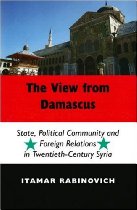http://blogs.law.harvard.edu/mesh/2008/11/the-view-from-damascus/
MESH invites selected authors to offer original first-person statements on their new books-why and how they wrote them, and what impact they hope and expect to achieve. Itamar Rabinovich was Israel’s chief negotiator with Syria, and is visiting professor of public policy at the Harvard Kennedy School. His new book is The View from Damascus: State, Political Community and Foreign Relations in Twentieth-Century Syria.
From Itamar Rabinovich
The View from Damascus is a collection of 21 essays and chapters that I have published over the years. The original idea of putting such a volume together came from the late Frank Cass, the London publisher. I then went over more than 30 essays and chapters with two questions in mind: Did each of them merit reproduction, thirty, twenty or ten years after original publication? And did the twenty essays that passed the test fit together as a coherent book rather than a loose collection of disparate essays and chapters dealing with the same country? The answer to the second question is inherent in the book’s subtitle: “State, Political Community and Foreign Relations in Twentieth-Century Syria.” The essays chosen do indeed fall neatly into these three major categories.
Syria’s transformation from a “geographic term” (to use Metternich’s language) into a state is an interesting and, in some respects, an unfinished tale. In the late 19th and early 20th century, the term referred to “Geographic” or “Natural” Syria (practically the Levant) and several of the essays deal with the contending concepts of the would-be Syrian entity and with the course of events that culminated in the creation of an independent Syrian state in its present boundaries. The tension between the notion and vision of a “Greater Syria” and the reality of the truncated Syrian state accounted for the latter’s weakness during the early decades of its existence as well as for its irredentist claims, first and foremost over Lebanon.
The conflict over the nature of the political community that inhabits or should inhibit the Syrian state is closely related to the conflicts over its territorial definition. During most of the 20th century, Arabism was the dominant ideology in Syria, but Arabism has a Sunni-Muslim tincture and the Christian and heterodox Shiite sects that form a significant part of Syria’s population refused to be marginalized. Several of the essays deal with the impact of these tensions on political ideologies and parties in Syria and with the remarkable process that catapulted the downtrodden Alawi minority to the pinnacle of power in Syria.
In coping with such themes as the role of ethnicity in Syrian’s modern history and politics, the advantage of dealing with the 20th century as a whole becomes evident. It is easy to trace the line from the French policy of cultivating the minorities as a bulwark against the hostility of the Arab-Sunni majority through the attraction of Alawis to military service and to the secularism of the Baath party to political domination based on the predominance of Baathist Alawi army officers since the 1960s.
The accent of the essays dealing with foreign relations is on two themes: Syria’s transformation under Hafez al-Asad from a weak state to a powerful regional actor, and the evolution of its relationship with Israel from the pure hostility of earlier decades to the mix of conflict and negotiations since 1991.
The volume’s concluding essay is taken from a forthcoming monograph written for the Saban Center at Brookings and dealing with the trilateral relationship between Washington, Jerusalem and Damascus during the past eight years. It was written with an eye to the unfolding policy debate in the United States and Israel. Several scenarios and options are sketched but priority is given to one. If the Obama administration wants to resume an active role in Arab-Israeli affairs, the Syrian track has several advantages over the Palestinian one. The emphasis on that track has shifted since its heyday in the 1990s. The cutting-edge issue is the prospect of detaching Syria from Iran, thereby transforming the geopolitical landscape in the region. The problem is that Syria is likely to play a familiar game and seek to straddle the line. Whether Washington and Jerusalem will find the effective negotiating strategies which eluded them so often in the past, remains an open question.
SPME Editor’s Note: This book may be purchased from SPMEMart with 6% of the purchase price donated to SPME. Click here




